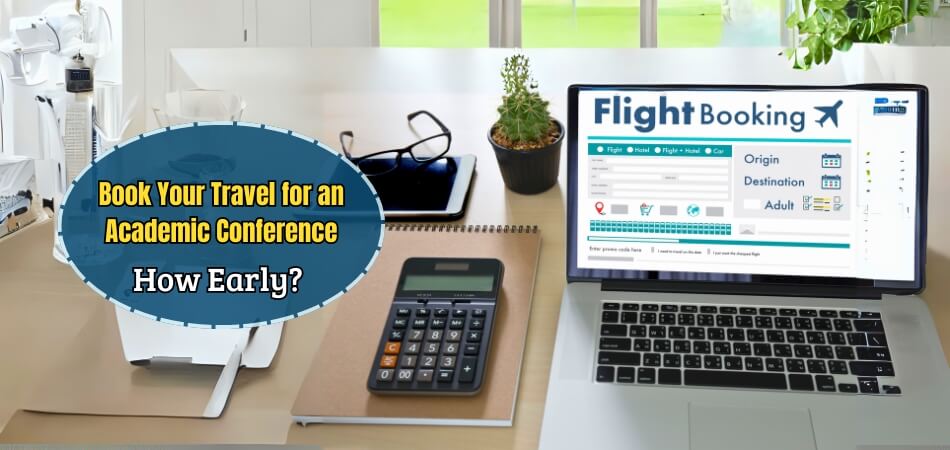Professionals, researchers, and academics come together for networking, knowledge sharing, and education at academic conferences. Planning travel for these events can be complex, raising questions like: How early should I book my travel for an academic conference? Getting the timing right can make all the difference.
To secure the best deals and ensure availability, book your travel 4–6 months in advance. This time frame allows you to access affordable flights and accommodations while maintaining flexibility for adjustments. Early booking is especially important during peak seasons or for conferences in high-demand locations.
Are you curious about the details of early booking strategies? Keep reading this article to discover all the necessary tips, insights, and practical advice to ensure smooth and budget-friendly travel for your academic conference.
Why Early Travel Booking Is Important for Academic Conferences?
Booking early lowers travel expenses and helps you get better deals. Flights and accommodations get expensive as the event nears. Booking early ensures affordable rates and gives you more options. This can save you money while ensuring a stress-free planning experience for your trip.
Planning your travel early guarantees availability, especially during peak seasons. Academic conferences often coincide with busy travel times, and delays can disrupt plans. Early bookings also allow you to plan additional activities like sightseeing. This can make your conference experience enjoyable and free from last-minute stress.
Additionally, securing early bookings ensures your preferred choices, especially for hotels near the venue. Procrastination might leave you with less desirable options or higher prices. Arriving stress-free sets a positive tone for the conference. You’ll feel prepared and more focused on your professional goals.
Suppose you’re planning to attend upcoming conferences in Canada. Booking early gives you time to compare costs and find better options. It also helps you manage your budget effectively. Early planning can be especially helpful when dealing with international travel restrictions or visa arrangements.
How Early Should I Book My Travel for an Academic Conference?
An academic conference requires careful planning and preparation. Timely travel arrangements are vital for a smooth experience. Here are some tips on when and how to book your journey.
Be Aware of the Best Time to Start Booking
Booking your travel 4–6 months before the conference helps you secure better rates and availability. Airlines and hotels often offer the most competitive prices during this timeframe. A well-timed booking also ensures you have more choices regarding travel routes and accommodations. Early bookings reduce stress and allow you to focus on preparing for your presentation or networking goals.
Consider Conference Dates and Location
Conference dates play a huge role in determining how early you should start arranging your travel plans. Popular cities or venues hosting multiple events tend to experience high demand for flights and hotels. By booking early, you can avoid inflated costs that occur closer to the conference. Always keep your travel dates flexible to snag the best possible deals.
Use Flexible Travel Options
Planning your trip with flexibility can streamline the booking process and result in significant cost savings. Opting for refundable tickets or accommodations gives you peace of mind in case of schedule changes. Tools like fare comparison websites or apps with price alerts can help you monitor cost fluctuations and secure deals early.
Align Travel Plans with the Conference Schedule
You can make the most of the conference’s opportunities by scheduling your arrival and departure around its schedule. Arriving a day before the start helps you acclimate, check in, and familiarize yourself with the venue. Similarly, booking your departure after the event’s conclusion allows you to attend late sessions or network without rushing.
Consider Group Travel Discounts
If colleagues or peers from your institution are attending the same conference, group bookings may offer discounts. Many airlines and hotels provide attractive deals for group travel, reducing costs per individual. Coordinating with fellow attendees also simplifies logistics and encourages collaboration during the trip. Research these options while booking to make travel economical and enjoyable.
Explore Accommodation Options Nearby
Staying close to the conference venue not only saves commute time but also keeps you engaged throughout the event. Booking accommodations early ensures you secure places near the conference venue, which are likely to sell out quickly. Hotels often provide discounts for early reservations or conference participants, so keep an eye on these deals.
Use Loyalty Programs and Discounts
Airline miles, hotel points, or university travel discounts can significantly lower your travel expenses for the conference. Registering for frequent traveler programs early gives you access to exclusive deals or upgrades. Many conferences also partner with travel providers to offer reduced rates to participants, so take advantage of these opportunities.
Monitor Travel Restrictions and Policies
The amount of time you need to finalize your plans may vary depending on travel restrictions or visa requirements. Checking these regulations ahead of time avoids delays or cancellations. Applying for a visa, if needed, often takes several weeks, so booking once you know your travel is confirmed prevents unnecessary complications.
Plan for Budget-Friendly Extras
Beyond flights and hotels, other costs like transportation, meals, and conference fees need planning to avoid overspending. Booking rental cars, airport transfers, or public transport passes early can lower overall expenses. Keeping a checklist of expected costs helps track and control spending throughout the process, ensuring a stress-free trip.
Booking your travel early helps reduce stress and ensure smoother logistics. By planning ahead, you can secure better rates, avoid last-minute complications, and fully prepare for an academic conference, making the most of your experience.
What Happens if I Book Too Late for An Academic Conference?
There can be serious problems if you book a late academic conference. Delays might lead to higher costs, limited accommodations, and stress. Planning is crucial for ensuring a smooth experience. Here’s more about what can happen when you book too late:
Higher Costs and Limited Discounts
Booking at the last minute typically leads to higher travel and accommodation costs. Hotels near the conference venue may raise prices closer to the event date. Flights can become more expensive, and discounted fares may no longer be available. These higher prices can affect your overall budget and reduce the financial benefits of attending.
Difficulty Finding Accommodations
If you wait until the last minute, finding available hotels or other accommodations may become a challenge. Many popular hotels near the conference venue might already be fully booked, forcing you to settle for options farther away. Staying further from the venue can increase transportation costs and affect the convenience of attending sessions.
Limited Session Availability and Opportunities
Booking too late can result in missing out on valuable sessions, workshops, or networking opportunities. Some events may require early registration for participation. By waiting, you risk losing the chance to attend the most sought-after sessions, limiting your experience and the potential benefits of the conference.
Increased Travel Stress and Logistics
Last-minute booking can create unnecessary stress when it comes to travel planning. With fewer flight options and accommodation choices available, you may have to settle for less convenient travel times. This can also affect your ability to plan for other events or meetings that might be crucial for your professional goals.
Missed Pre-conference Materials or Preparation
When you book too late, you may not have time to review important pre-conference materials. Many conferences send out resources or guidelines ahead of time, helping attendees prepare for key discussions or activities. Missing out on these materials can leave you unprepared and less able to take full advantage of the conference experience.
Booking early offers several benefits for a successful academic conference experience. It helps you save money, secure preferred accommodations, gain access to essential materials, and participate fully in all opportunities available, ensuring a stress-free event.
What Should I Do if Your Travel Plans Unexpectedly Change for an Academic Conference?
Unexpected changes to travel plans for an academic conference can create challenges, but adaptability ensures success. Focusing on quick solutions, staying informed, and maintaining flexibility are key. Here’s a guide with practical advice to address unexpected disruptions efficiently:
Reassess and Update Your Travel Arrangements
When plans change suddenly, contacting your airline, hotel, or transport provider should be a priority. Flexible policies can often accommodate adjustments without significant additional costs. Consider reviewing safety tips for traveling to academic conferences to help ensure your revised plans align with a secure and seamless experience.
Communicate with Conference Organizers
Keeping organizers informed about changes in your travel plans can help minimize disruptions to your schedule. They may suggest alternative options or reschedule missed sessions. Organizers often provide guidance to attendees facing challenges, ensuring a smoother transition back into the conference.
Adjust Your Itinerary and Focus on Priorities
Revisit your itinerary and decide which sessions or meetings are most important to attend. Skipping less significant events can reduce stress and make up for lost time. Flexibility in prioritizing goals allows you to adapt effectively without missing essential aspects of the conference.
Stay Connected with Networking Opportunities
Changes to plans should not prevent you from making meaningful connections. Use online platforms or messaging tools to connect with fellow attendees. Staying proactive about networking ensures you can still achieve professional goals despite travel disruptions.
Prepare for Delays and Keep Necessary Supplies
Having essential items such as chargers and documents ready can prevent delays caused by unexpected changes. Packing with adaptability in mind can save time and stress if you need to quickly alter plans. Always consider travel safety measures for unforeseen situations.
Managing unexpected changes requires adaptability, clear communication, and resourcefulness. Early preparation and focus on priorities will ensure a productive and successful conference experience.
Tips for Getting the Best Travel Deals for Academic Conferences
Securing the best travel deals for academic conferences can save you time and money. Planning early, comparing options, and being flexible are key strategies. Here are some practical tips to help you get the best travel deals:
- Book Early: Booking your travel and accommodations as soon as possible can often result in significant savings. Many airlines and hotels offer discounts for early bookings, allowing you to secure the best rates.
- Use Fare Comparison Tools: Take advantage of websites and apps that compare flight prices across multiple airlines. These tools help you find the most affordable options by showing you a range of fares for your desired travel dates.
- Be Flexible with Dates: Traveling a day earlier or later can sometimes save you hundreds of dollars. If your schedule allows, experiment with different dates to see if a slight change reduces travel costs.
- Sign Up for Alerts: Many travel websites offer price alerts, notifying you when prices drop for your desired route. Signing up for these alerts can help you track the best deals as soon as they become available.
- Consider Alternative Airports: Flying in and out of alternative airports nearby can sometimes be much cheaper than using major hubs. Check smaller airports for discounted flight options, even if they require a bit more travel time.
- Use Student or Academic Discounts: Look for airlines, hotels, or travel services that offer special discounts for students or academic professionals. These discounts can often provide significant savings, especially for conference-related travel.
- Book Connecting Flights: Direct flights are often more convenient but can be much more expensive. Consider booking flights with one or more layovers to lower your travel costs, but ensure it doesn’t compromise your time too much.
- Consider Package Deals: Many travel agencies offer package deals that combine flights, accommodations, and sometimes even meals. These can often be cheaper than booking each element separately, especially for academic travel.
- Use Reward Points or Miles: If you have a travel rewards credit card or frequent flyer miles, use them to cover part of your travel costs. Accumulating points can significantly reduce airfare or even hotel expenses.
- Check for Hidden Fees: Some travel websites and airlines may advertise low prices but have hidden fees. Make sure to check for additional costs like baggage fees, seat selection fees, or resort fees before making your booking.
By taking the time to plan and explore all available options, you can ensure that your academic conference travel is cost-effective. A little research and flexibility can lead to substantial savings, allowing you to focus on the event itself.
FAQs About How Early Should I Book My Travel for an Academic Conference?
From scheduling to logistics, there are many factors to take into account when organizing your trip to an academic conference. This FAQ section addresses common questions about booking early and provides practical advice for a smooth and cost-effective experience. Find answers to ensure a successful journey for your conference participation.
What Are The Risks Of Booking Too Early?
Booking too early can sometimes lead to missed opportunities. Prices might drop or better deals may arise closer to the event. Additionally, some accommodations or flights may offer more flexible options as the date approaches. Strike a balance between booking early for security and waiting for better deals.
Can I Adjust My Travel Plans After Booking?
Yes, many airlines and hotels offer flexible policies that allow adjustments after booking. When making your reservation, choose refundable or changeable options to avoid additional fees. Always read the cancellation and modification policies carefully to understand the conditions that apply. Early booking with flexibility ensures you can handle unexpected changes easily.
Are There Discounts For Booking Group Travel?
Group travel reservations frequently result in savings from hotels and airlines. These discounts can significantly reduce the overall cost of your trip. It’s advisable to organize group bookings well in advance, as many companies offer special rates for groups. Ensure that all participants coordinate their travel dates and arrangements.
How Do International Travel Policies Affect Booking?
For international conferences, travel policies like visa requirements and entry regulations can impact how early you need to book. Applying for a visa often takes several weeks, and entry restrictions can change quickly. To avoid complications, book early enough to allow time for processing documents, ensuring smooth travel and avoiding last-minute disruptions.
Should I Book Flights And Hotels Together?
Purchasing hotels and flights at the same time can result in significant savings. Many travel agencies and booking sites offer bundled deals that combine both services at a reduced price. However, before committing, compare these package deals with separate bookings. In some cases, booking each separately may still be the more cost-effective option.
How Do Seasonal Trends Impact Booking Timelines?
Seasonal trends heavily influence travel prices. During peak seasons, such as holidays or summer, flights and accommodations tend to be in higher demand, leading to inflated prices. Early bookings are essential during these times to secure reasonable rates. For off-peak periods, it may be possible to book closer to the event without significant price increases.
End Note
Early travel planning can make all the difference when attending an academic conference. It allows you to secure better rates, a wider selection of accommodations, and a stress-free experience leading up to the event. Early planning ensures a smoother journey overall.
When considering “How early should I book my travel for an academic conference?” the best timeframe is typically 4–6 months before the event. This gives you access to the best deals, flexible options, and ample time to finalize all logistics without the pressure of last-minute bookings.
To wrap up, always compare prices, stay flexible with dates, and keep track of potential discounts. Planning saves money and time, making your conference experience more enjoyable. Best wishes as you prepare for a successful and rewarding conference trip!








